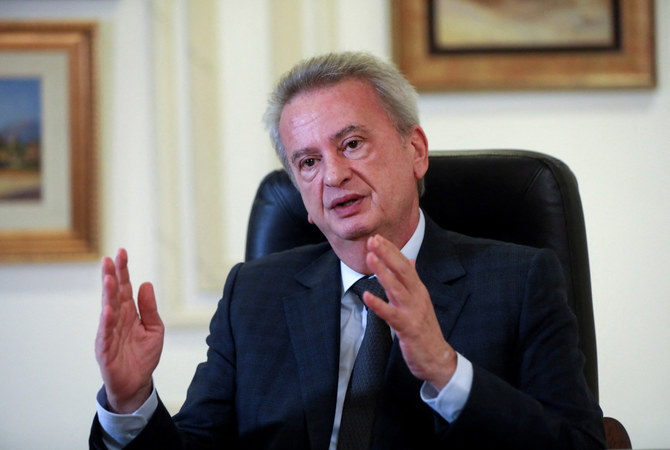BEIRUT: Lebanon’s political and economic meltdown descended into farce on Thursday when the head of the central bank was charged with embezzlement, money laundering and tax evasion.
Investigating judge Raja Hamoush filed the charges against Riad Salameh, governor of the Banque du Liban, his brother Raja and an adviser, Marianne Hoayek. Hamoush referred the case to Investigative Judge Charbel Abou Samra.
The charges follow an 18-month investigation by Lebanese authorities into allegations that Salameh and his brother embezzled more than $300 million from the central bank between 2002 and 2015. Judicial authorities in at least five European countries are investigating similar allegations.
The brothers deny the charges. Riad Salameh said the accusations of illicit enrichment are part of an effort to scapegoat him for Lebanon’s financial collapse, which has brought increased scrutiny of his role as governor. The head of the central bank since 1993, he still enjoys backing from powerful Lebanese leaders.
He said the charges were “not an indictment” and pledged to abide by judicial procedures. “One is innocent until proven guilty by a court of law,” he said.
A judicial source told Arab News the investigation began in January 2022, when Salameh was summoned three times for questioning at the Justice Palace in Beirut.
The investigating judge is now likely to again summon Salameh for questioning, according to the source, and would have a number of options including detaining the governor or releasing him on bail.
Many judges in Lebanon owe their appointments to politicians and their decisions are often overtly politicized. The judicial source told Arab News the charges against Salameh were in part political retaliation for an order on Wednesday by caretaker Prime Minister Najib Mikati that instructed police and security forces to ignore instructions from Judge Ghada Aoun, who is investigating banking crimes.
Mikati had sent a letter to Interior Minister Bassam Mawlawi in which he said said Aoun had overstepped her authority and “committed violations in lawsuits relating to banks, had previously refused the warrants issued against her and ignored all the dismissal requests made against her.”
Aoun responded by describing the prime minister’s edict as “unprecedented interference in the work of the judiciary.” She is prosecuting several Lebanese banks over money-laundering allegations, based on lawsuits filed by activists from the Pioneers of Justice organization.
The judicial source told Arab News: “Judge Aoun is affiliated with the Free Patriotic Movement and is politicized, and it seems that the movement decided to respond to Mikati’s move by pushing for action on another judicial file, which is the one with Judge Hamoush.”
Nicolas Nahas, an adviser to Mikati, said Mikati and Mawlawi made their decision because they believe Aoun’s actions are significantly flawed.
“The public prosecutor had previously issued a decision prohibiting her from interfering with the files she is investigating but she didn’t abide by it,” he added.
The Amwalouna Lana association held a protest outside the Justice Palace in Baabda on Thursday in support of Aoun. Activists held signs that read “No to political interference with the judiciary” and “No to the punishment of those who have the courage to face the corrupt people.”
Aoun’s spokesperson, lawyer Pascale Fahd, said the judge “continues in her work and performs her duties in the case of depositors and banks and combating money laundering.”
The lawyer added: “The decision taken against her is illegal and does not stop her work. Judge Ghada Aoun has the appropriate and legal ways to implement arrest warrants. She will not watch the Lebanese people being stolen from, nor will she stand by as our prime minister takes the side of those who stole from us, and protects them.”
The Lebanese Judges Club, an activist group that emerged during the current political deadlock, criticized “the blatant interference in the judiciary, which constitutes a dangerous precedent that violates the most basic legal principles, and should be retracted immediately without delay.”
Salameh current term as governor is due to end in July and he has said he does not intend to remain in the post. The Free Patriotic Movement tried to replace Salameh as governor during former President Michel Aoun’s time in office but other parties rejected the attempts.
Industrial action by banks in Lebanon began on Feb. 7 and the strike continues. Their work is currently limited to ensuring ATMs continue to operate.
The action was taken after Aoun issued summonses for bankers and ordered banks to lift the veil of secrecy surrounding some accounts. Industry figures argue that her actions are damaging the reputation of the Lebanese banking sector abroad for reasons related to internal political conflicts.

























